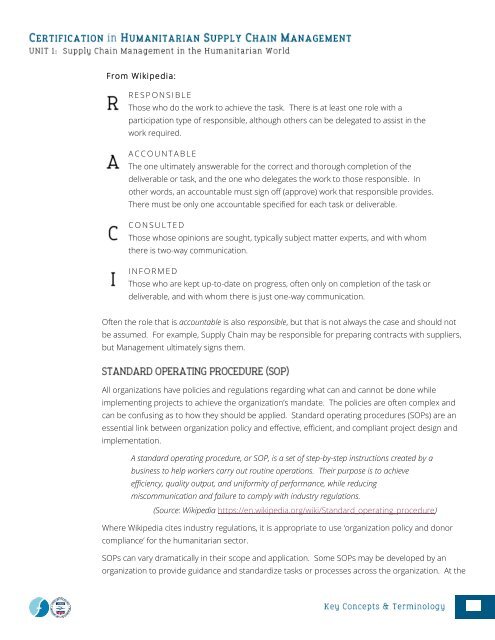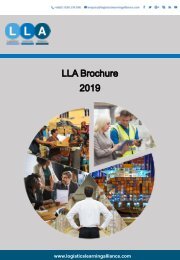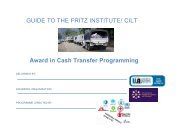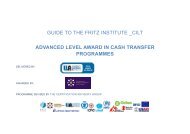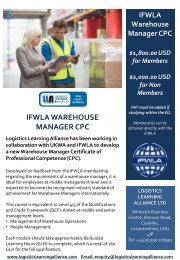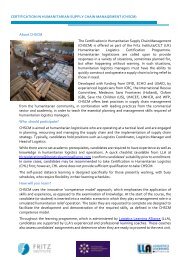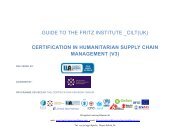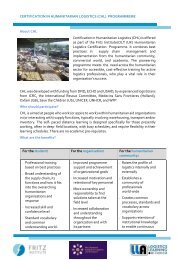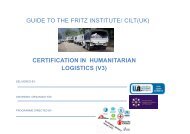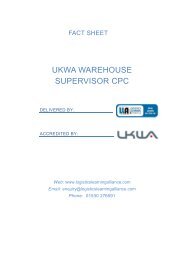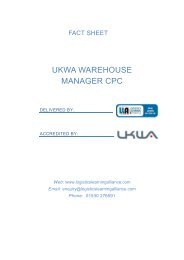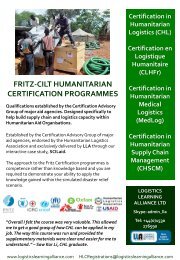CHSCM 3.0 - Unit 1 - SCM in the Humanitarian World
Learning Materials for Unit 1 of the Certification in Humanitarian Supply Chain Management (CHSCM).
Learning Materials for Unit 1 of the Certification in Humanitarian Supply Chain Management (CHSCM).
You also want an ePaper? Increase the reach of your titles
YUMPU automatically turns print PDFs into web optimized ePapers that Google loves.
From Wikipedia:<br />
R E S P O N S I B L E<br />
Those who do <strong>the</strong> work to achieve <strong>the</strong> task. There is at least one role with a<br />
participation type of responsible, although o<strong>the</strong>rs can be delegated to assist <strong>in</strong> <strong>the</strong><br />
work required.<br />
A C C O U N T A B L E<br />
The one ultimately answerable for <strong>the</strong> correct and thorough completion of <strong>the</strong><br />
deliverable or task, and <strong>the</strong> one who delegates <strong>the</strong> work to those responsible. In<br />
o<strong>the</strong>r words, an accountable must sign off (approve) work that responsible provides.<br />
There must be only one accountable specified for each task or deliverable.<br />
C O N S U L T E D<br />
Those whose op<strong>in</strong>ions are sought, typically subject matter experts, and with whom<br />
<strong>the</strong>re is two-way communication.<br />
I N F O R M E D<br />
Those who are kept up-to-date on progress, often only on completion of <strong>the</strong> task or<br />
deliverable, and with whom <strong>the</strong>re is just one-way communication.<br />
Often <strong>the</strong> role that is accountable is also responsible, but that is not always <strong>the</strong> case and should not<br />
be assumed. For example, Supply Cha<strong>in</strong> may be responsible for prepar<strong>in</strong>g contracts with suppliers,<br />
but Management ultimately signs <strong>the</strong>m.<br />
All organizations have policies and regulations regard<strong>in</strong>g what can and cannot be done while<br />
implement<strong>in</strong>g projects to achieve <strong>the</strong> organization’s mandate. The policies are often complex and<br />
can be confus<strong>in</strong>g as to how <strong>the</strong>y should be applied. Standard operat<strong>in</strong>g procedures (SOPs) are an<br />
essential l<strong>in</strong>k between organization policy and effective, efficient, and compliant project design and<br />
implementation.<br />
A standard operat<strong>in</strong>g procedure, or SOP, is a set of step-by-step <strong>in</strong>structions created by a<br />
bus<strong>in</strong>ess to help workers carry out rout<strong>in</strong>e operations. Their purpose is to achieve<br />
efficiency, quality output, and uniformity of performance, while reduc<strong>in</strong>g<br />
miscommunication and failure to comply with <strong>in</strong>dustry regulations.<br />
(Source: Wikipedia https://en.wikipedia.org/wiki/Standard_operat<strong>in</strong>g_procedure)<br />
Where Wikipedia cites <strong>in</strong>dustry regulations, it is appropriate to use ‘organization policy and donor<br />
compliance’ for <strong>the</strong> humanitarian sector.<br />
SOPs can vary dramatically <strong>in</strong> <strong>the</strong>ir scope and application. Some SOPs may be developed by an<br />
organization to provide guidance and standardize tasks or processes across <strong>the</strong> organization. At <strong>the</strong>


